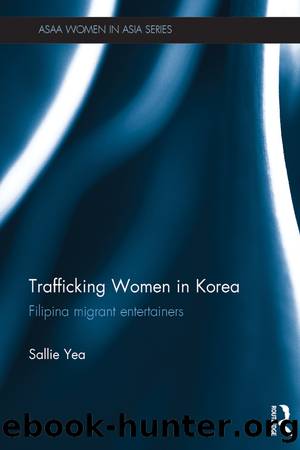Trafficking Women in Korea by Sallie Yea

Author:Sallie Yea [Yea, Sallie]
Language: eng
Format: epub
Tags: Social Science, Ethnic Studies, General, Regional Studies
ISBN: 9781135008239
Google: N8AqBwAAQBAJ
Publisher: Routledge
Published: 2015-03-24T05:02:33+00:00
Strategic intimacy
Intimacy, emotion and affect have generated a crescendo of interest in the social sciences of late, including in geography where they have nonetheless rarely led to a focus on commercial sexual labour or, indeed, human trafficking. This may be, as Viviana Zelizer (2005) explains, because the transacted nature of commercial sexual services tends to preclude its location within intimate and affective relations. Despite this, several recent anthropological accounts of sex tourism in the Caribbean and Southeast Asia have disrupted this view. Brennanâs (2004) account of the tourist town of Sousa in the Dominican Republic illustrates the significant role that open-ended prostitution plays in enabling women to attempt to achieve immediate goals of financial stability but also long-term ones associated with their movement beyond the site in which their sexual labouring takes place. Her analysis nonetheless highlights the precarity of such strategies, which for many women did not ultimately improve their situations either in Sousa or abroad.
Kempadooâs (1999) analysis of sex workers in the Caribbean also explores the ways sex workers utilise strategies for social and economic advancement that hinge on sexual labour beyond the client-prostitute transaction. Re-working subjectivity through the expression of agency is a key theme in studies of migrant and tourist-oriented sex work. In tracing the historical situatedness of contemporary forms of sex work in the Caribbean Kempadoo (1999: 8) suggests that historically under slavery sex was a strategy by women to acquire freedom from oppression: âExoticism, while constituting a form of control and domination over women of colour, was thus also strategically transformed through sex work to economically and socially empower women, men and childrenâ, leading to the subversion and reconstitution of power relations since it âdisrupts notions of prostitution as simply a relationship based on an exchange of sex for money or as a source of oppression for womenâ. Discussing Filipinas specifically, Hildson and Giridharan (2008: 612) also note the ability of those working in Sabahâs nightlife industries to âresist, negotiate and participate in forging their subjectivitiesâ, rendering domination incomplete (cf. Scott 1985).
This work indicates that money is tied to intimate relationships with customers-cum-boyfriends, but not in ways that suggest sex is only a transaction or encounters are primarily about transacted sex. Visas as an emblem of onward and outward mobility, and sincere romance with a customer, further complicate these encounters as women attempt to enmesh their own transnational mobility and romantic aspirations within them. The concept of âstrategic intimacyâ illuminates the ways in which women attempt to negotiate and resist their marginal circumstances in gijichâon clubs by strategically cultivating intimate relationships with selective customers. Cabezas (2009:23) applies the similar concept of âtactical sexâ to the sex tourism sectors in Cuba and the Dominican Republic in order to âcapture the diverse, amorphous ways in which sex is deployed in tourist economiesâ. I found that most Filipina entertainers in gijichâon do not position themselves as sex workers, with intimacy being a more readily acceptable resource for their encounters with customers than sex. Moreover, while a tactic
Download
This site does not store any files on its server. We only index and link to content provided by other sites. Please contact the content providers to delete copyright contents if any and email us, we'll remove relevant links or contents immediately.
| Anthropology | Archaeology |
| Philosophy | Politics & Government |
| Social Sciences | Sociology |
| Women's Studies |
Nudge - Improving Decisions about Health, Wealth, and Happiness by Thaler Sunstein(7706)
The Fire Next Time by James Baldwin(5442)
iGen by Jean M. Twenge(5415)
Adulting by Kelly Williams Brown(4574)
The Sports Rules Book by Human Kinetics(4386)
The Hacking of the American Mind by Robert H. Lustig(4382)
The Ethical Slut by Janet W. Hardy(4251)
Captivate by Vanessa Van Edwards(3839)
Mummy Knew by Lisa James(3691)
In a Sunburned Country by Bill Bryson(3542)
The Worm at the Core by Sheldon Solomon(3487)
Ants Among Elephants by Sujatha Gidla(3467)
The 48 laws of power by Robert Greene & Joost Elffers(3291)
Suicide: A Study in Sociology by Emile Durkheim(3022)
The Slow Fix: Solve Problems, Work Smarter, and Live Better In a World Addicted to Speed by Carl Honore(3009)
The Tipping Point by Malcolm Gladwell(2921)
Humans of New York by Brandon Stanton(2873)
Get What's Yours for Medicare: Maximize Your Coverage, Minimize Your Costs by Philip Moeller(2728)
Handbook of Forensic Sociology and Psychology by Stephen J. Morewitz & Mark L. Goldstein(2705)
